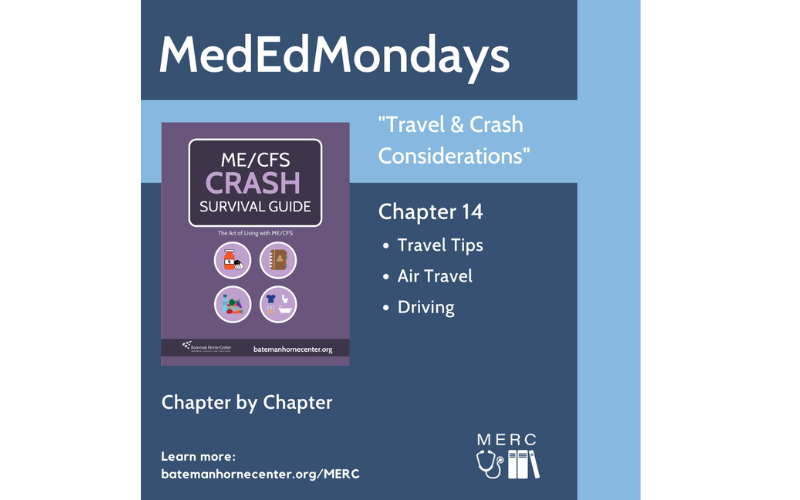This blog post covers the fourteenth chapter of the ME/CFS Crash Survival Guide. The information provided can also apply to individuals with Long COVID and other multi-system chronic complex illnesses that have post-exertional malaise (PEM) symptoms.
Click here to download the entire guidebook.
Travel Tips
Travel and Crash Considerations
Traveling, while wonderful, can put you at risk for a crash. The increased energy expenditure physically, cognitively, and emotionally can use up your energy reserves more quickly than you would think. Here are some tips that may help you have less chance of crashing and use your energy more slowly.
- Make sure you rest and hydrate well for a number of days prior to travel. Consider seeking IV hydration therapy one to two days prior to departure.
- Make sure you have enough medications with you, especially any controlled substances.
- Make sure you have a current medication list and contact information for your health care providers.
- Anticipate a few days of needing to rest when you get to your destination and when you get home.
- Plan a gentle itinerary allowing for rest throughout the day.
- If your destination is at a lower elevation you may have more energy. This is great, but remember to pace yourself and listen to your body. Higher elevations can be more taxing.
- Eat regular small meals and stay hydrated. If you have food intolerances, be careful to avoid food triggers.
Air Travel
- Book flights that enable you to stay on a normal sleep/wake cycle.
- If the trip is long, consider a layover day en route.
- Try to minimize multiple connections.
- Use sidewalk services such as Sky Cap to take care of your bags. This way you won’t be carrying luggage around.
- Try to minimize carry-on luggage.
- Your carry-on bag should have at least a few days worth of medications in case your luggage gets lost. Or, if possible, carry all your medications with you.
- If you have connections, give yourself plenty of time to get from one gate to the next.
- Utilize in-terminal transportation such as wheelchairs or motorized carts to get to your gate.
- Wear sunglasses and earplugs to limit stimulation.
- Once through security, make sure you prioritize getting water and have electrolytes with you.
- Wear compression clothing.
Driving
- Try to minimize long days of driving. Even though you are “just sitting,” you will still burn through more energy than you realize.
- Try to have someone else drive or frequently switch off driving.
- Try to keep your feet elevated as much as possible.
- Wear compression clothing.
- Minimize stimulation by wearing sunglasses and earplugs.
- If you are driving and feel yourself starting to show signs or symptoms of a crash:
- Pull over and put the car in park.
- Inform an emergency contact.
- Try to go horizontal, and rest if it is a safe location.
- Chug a rehydration packet, and de-stimulate the environment.
- Do not continue driving if you feel a crash coming on, as this is a safety concern for your health and those on the road with you.
- If after your rest break you do not improve, call for help and have them transport you home. You can always get your car at a later time, or another person can drive your car back to your residence.
This blog post covers the fourteenth chapter of the ME/CFS Crash Survival Guide.
Click here to download the entire guidebook.
The information provided can also apply to individuals with Long COVID and other multi-system chronic complex illnesses that have post-exertional malaise (PEM) symptoms.
Bateman Horne Center relies on charitable contributions to produce
educational content such as the ME/CFS Crash Survival Guide.
Support our work by donating today!

 Lucinda Bateman, MD, is a renowned clinician, researcher, and educator. Her Johns Hopkins University Medical School training instilled an approach to care that she has employed throughout her career - the patient comes first and the unknown or unexplained does not equate to a lack of proper and compassionate care. Since starting her own practice in 2000, she has served on six boards or committees, been the principal investigator for 45 studies, authored/coauthored 40 journal articles, served as adjunct instructor and adjunct assistant professor in the University of Utah Departments of Preventative Medicine, Internal Medicine, and Anesthesiology, and lectured around the world.
Lucinda Bateman, MD, is a renowned clinician, researcher, and educator. Her Johns Hopkins University Medical School training instilled an approach to care that she has employed throughout her career - the patient comes first and the unknown or unexplained does not equate to a lack of proper and compassionate care. Since starting her own practice in 2000, she has served on six boards or committees, been the principal investigator for 45 studies, authored/coauthored 40 journal articles, served as adjunct instructor and adjunct assistant professor in the University of Utah Departments of Preventative Medicine, Internal Medicine, and Anesthesiology, and lectured around the world.